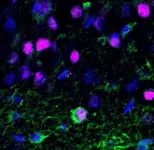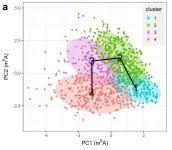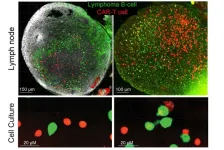(Press-News.org) UNC researchers awarded up to $10M to leverage data science to accelerate cancer diagnosis and optimize delivery of precision oncology
CHAPEL HILL, North Carolina—A team of UNC-Chapel Hill researchers has been awarded up to $10 million in Advanced Research Projects Agency for Health (ARPA-H) funding to develop the Cancer Identification and Precision Oncology Center (CIPOC). The project is designed to improve cancer diagnosis and support personalized treatments by quickly aggregating and analyzing a wide range of health data, including electronic health records, histopathological and radiological images, insurance claims and geographic information.
Specifically, CIPOC will facilitate the development of an oncology health learning system that utilizes AI-ready data to generate real-time identification of new cancer cases, support patient recruitment for research, recommend precision cancer care, and help improve cancer care equity and quality. It also will create an accessible, adaptable system for health providers across diverse locations and resources.
The project is led by four principal investigators across Carolina:
Ashok Krishnamurthy, PhD, director of the Renaissance Computing Institute (RENCI) and data science core lead.
Jennifer Elston Lafata, PhD, professor in the Division of Pharmaceutical Outcomes and Policy at the UNC Eshelman School of Pharmacy and innovation and optimization partners lead.
Caroline Thompson, PhD, MPH, associate professor of epidemiology at UNC Gillings School of Global Public Health and rapid identification core lead.
Melissa Troester, PhD, MPH, professor of epidemiology at UNC Gillings and precision oncology core lead.
“CIPOC is a multi-disciplinary project that will significantly advance not just rapid cancer identification and precision oncology but also health data science and informatics,” said Krishnamurthy, a research professor of computer science at UNC-Chapel Hill. “The approaches we are developing can be used in other areas of health care, which is possible because CIPOC brings together diverse expertise across a number of fields to work together on a common goal.”
The project will organize and facilitate collaborative research conducted by faculty, staff and trainees from more than 12 schools, centers, departments and programs at UNC-Chapel Hill with a shared vision to create cutting-edge data tools researchers and practitioners can use at UNC – and in time across North Carolina and the United States – to improve the diagnosis and treatment of cancer.
“While precision oncology has made major advances in recent years, translation of these innovations to practice has lagged behind as has our ability to monitor, track, and therefore understand and plan for needed cancer-related services,” said Thompson, a UNC Lineberger Comprehensive Cancer Center member. “By accelerating the identification of cancer cases and developing innovative informatics tools to make improved, precision recommendations for care, this project can advance the provision of equitable care services and delivery.”
The three-year project will focus on building an oncology learning health system at UNC Health, with the potential to expand across North Carolina and nationally. A learning health system integrates scientific evidence, and culture into daily care with a commitment to continuous improvement and innovation. The goal is to produce high-quality and high-value care that is equitable across diverse populations.
"As part of our efforts, we are forming a panel of nationally recognized experts and advisors. This panel will provide our team with ongoing feedback and serve as an independent sounding board. Their input is crucial to ensuring the usability and acceptability of our processes and products,” said Lafata, co-lead of the UNC Lineberger’s Cancer Care Quality Initiative. “This step is essential given our focus on accelerating academic discovery, optimizing cancer care delivery and supporting public health reporting. Additionally, these advisers will help us minimize any inherent biases in our work.”
CIPOC will utilize AI tools, including large language modeling, to quickly standardize, harmonize and link structured and unstructured data from multiple sources, enabling more precise tracking and treatment for different cancer types.
It also will develop an AI-driven virtual multidisciplinary tumor board to support the provision of precision oncology care. Studies have shown multidisciplinary tumor boards, in which a group of experts in different specialties review and discuss patients’ medical conditions and treatment options, can improve cancer outcomes. The board will use AI-ready datasets, including electronic health record-derived clinical data and histopathological and radiological images, to help inform prediction of risk and tumor progression as well as treatment decision making.
“We want to make precision oncology more widely available to North Carolinians. This project aims to develop tools that will use common medical record data to define care that responds to each patient's unique tumor biology, reducing the need for additional, costly testing,” said Troester, co-leader of the UNC Lineberger Cancer Epidemiology Program.
CIPOC will make its data tools open source, allowing them to be scaled and adapted by health systems of any size, thus improving the use of clinical data for research and cancer care across a broad spectrum of communities. This innovation aligns with ARPA-H’s national goals to strengthen health care system resilience and equity.
The development and submission of the ARPA-H proposal was supported by the UNC Office of Research Development, with oversight by Nathan Blouin, MBC, CRA, assistant vice chancellor for research development, and Nate Warren, PhD, research development manager.
END
UNC researchers awarded up to $10M to leverage data science to accelerate cancer diagnosis and optimize delivery of precision oncology
2024-12-05
ELSE PRESS RELEASES FROM THIS DATE:
Cardiovascular disease symptoms surprisingly high in young refugees
2024-12-05
Many individuals seeking asylum in the United States show increased stress and pain symptoms that are associated with indications of cardiovascular disease according to Weill Cornell Medicine researchers.
“We would not have expected the rates of these illnesses or conditions to be this high in such a young, otherwise healthy population,” said the study’s senior author, Dr. Gunisha Kaur, associate professor of anesthesiology and an anesthesiologist at NewYork-Presbyterian/Weill Cornell Medical Center.
The study, published Dec. 5 in Nature Mental Health, analyzed medical evaluations from 453 U.S. asylum seekers for symptoms associated with psychological ...
To remember conversations, keep making new brain cells
2024-12-05
Why do adults make new brain cells? A new study published in Cell Stem Cell provides the first cellular evidence that making new brain cells in adults supports verbal learning and memory, which enables people to have conversations and to remember what they hear. This discovery could point to new approaches to restore cognitive function.
The study, led by scientists from USC Stem Cell and the USC Neurorestoration Center at the Keck School of Medicine of USC, relied on brain tissue from patients with drug-resistant cases of mesial temporal lobe epilepsy (MTLE), which involves seizures as well as accelerated cognitive decline.
“Treating patients with epilepsy ...
RNA modifications in individual cells better understood with new modelling
2024-12-05
Researchers have developed a new tool that will help scientists study how genes are expressed in our cells. The tool, called SigRM, is used to analyse data from single-cell epitranscriptomics, a method for studying RNA modifications in individual cells. This research could lead to important insights into health and disease.
Recent advances in single-cell technology have enabled researchers to analyse thousands of individual cells at once, providing rich information about the expression and activity of genes and proteins, as well as chemical changes that affect gene expression. A major tool in these studies is single-cell epitranscriptomics, which studies RNA ...
In five cancer types, prevention and screening have been major contributors to saving lives
2024-12-05
Improvements in cancer prevention and screening have averted more deaths from five cancer types combined over the past 45 years than treatment advances, according to a modeling study led by researchers at the National Institutes of Health (NIH). The study, published Dec. 5, 2024, in JAMA Oncology, looked at deaths from breast, cervical, colorectal, lung, and prostate cancer that were averted by the combination of prevention, screening, and treatment advances. The researchers focused on these five cancers because they are among the most common causes of cancer deaths and strategies ...
Estimation of cancer deaths averted from prevention, screening, and treatment efforts, 1975-2020
2024-12-05
About The Study: In this model-based study using population-level cancer mortality data, an estimated 5.94 million cancer deaths were averted for breast, cervical, colorectal, lung, and prostate cancers combined from 1975 to 2020. Prevention and screening accounted for 8 of every 10 averted deaths, and the contribution varied by cancer site. Despite progress, efforts to reduce the U.S. cancer burden will require increased dissemination of effective interventions and new technologies and discoveries.
Corresponding ...
Estimated reduction in health care spending associated with weight loss in adults
2024-12-05
About The Study: In this cross-sectional study, projected annual savings from weight loss among U.S. adults with obesity were substantial for both Medicare and employer-based insurance.
Corresponding Author: To contact the corresponding author, Kenneth E. Thorpe, PhD, email kthorpe@emory.edu.
To access the embargoed study: Visit our For The Media website at this link https://media.jamanetwork.com/
(doi:10.1001/jamanetworkopen.2024.49200)
Editor’s Note: Please see the article for additional information, including other authors, author contributions ...
Satellite-based and street-view green space and adiposity in US children
2024-12-05
About The Study: The results of this cohort study of U.S. children suggest that higher levels of satellite-based normalized difference vegetation index greenness and percentages of street-level green space components (flowers, plants, and fields) were associated with lower adiposity. The findings support the exploration of increasing residential green space levels and adding specific green space components as an urban planning and public health intervention strategy to combat the prevalence of childhood obesity in the U.S.
Corresponding Author: To contact the corresponding author, Li Yi, PhD, email li_yi@hsph.harvard.edu.
To access the embargoed study: ...
Psilocybin therapy helps clinicians process COVID despair
2024-12-05
Psilocybin-assisted psychotherapy resulted in significant reductions in depression among clinicians who provided front-line COVID-19 care in 2020 and 2021. These reductions were measurably greater than those experienced by the cohort of clinicians who received a placebo instead.
Findings from this double-blind, randomized clinical trial are to be published in JAMA Network Open at 8 a.m. PST Thursday, Dec. 5..
“For doctors and nurses who feel burned out or disillusioned or disconnected from the patient care they want to provide, this study shows that psilocybin ...
Feminist mothers may be compromising their own children's sex education at home
2024-12-05
Parents don't need to be blamed or shamed when providing sex education to their children, they need better support to help them safely parent their children in an increasingly complicated, digital world without compromising their values, say researchers from the University of Surrey.
In a new study, researchers from Surrey's School of Sociology found that self-identified feminist mothers across England unintendedly compromised their values about children's rights to comprehensive sex education due to societal pressures and fears of judgement.
While participants shared their ...
Anticancer drugs could make immunotherapies more effective
2024-12-05
An emerging class of anticancer drugs called EZH2 inhibitors may greatly enhance the potency of some cancer immunotherapies, according to a preclinical study led by Weill Cornell Medicine lymphoma researchers.
The inhibitors target the EZH2 enzyme, whose activity in tumor cells is now recognized as a significant factor in many cancers. The study, published Dec. 5 in Cancer Cell, found that EZH2 inhibition combined with T-cell based immunotherapy worked better at shrinking non-Hodgkin B-cell lymphomas ...






